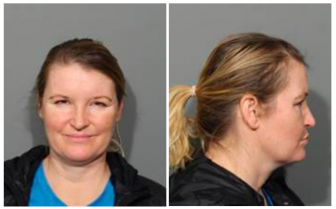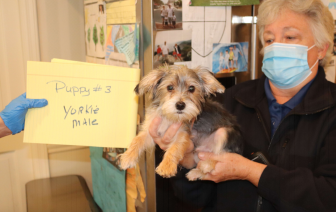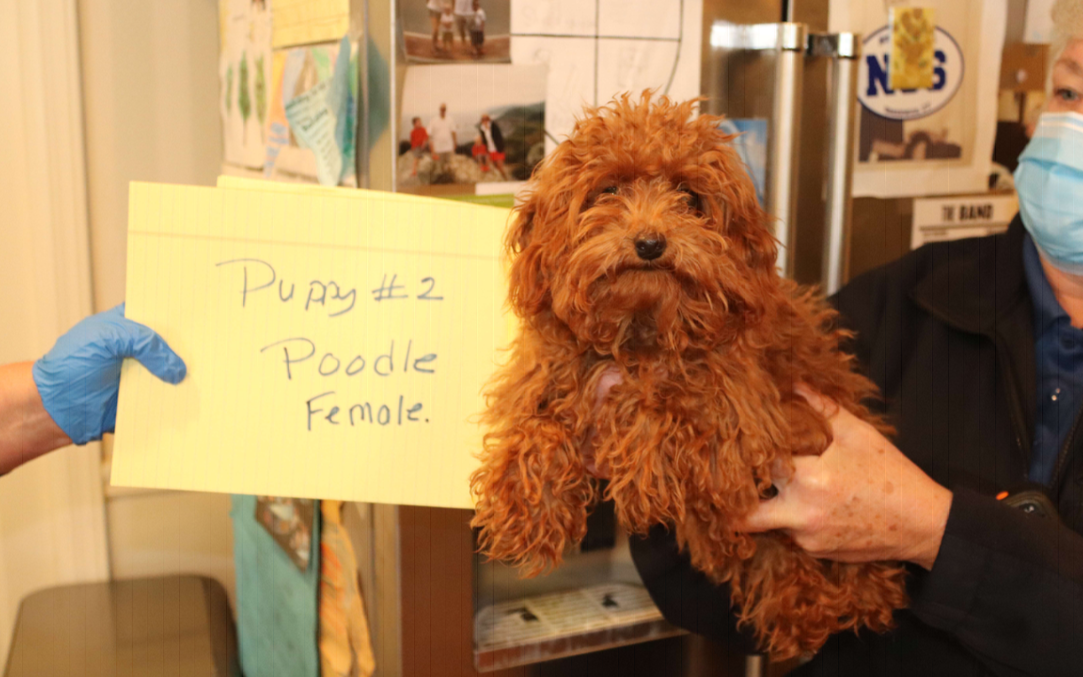Saying the owner of 12 dogs seized by police last month has been neglectful in caring for the animals, a state Superior Court judge on Monday awarded temporary custody to the town.

Catherine Palmer, 48, has been charged with Cruelty to Animals. Mugshot courtesy of the New Canaan Police Department
In petitioning the court for ownership, the town through remote hearings demonstrated “multiple aspects of neglect and disregard for the welfare of the animals” by 48-year-old Catherine Palmer, Judge Kenneth B. Povodator wrote in his decision.
“To varying degrees, the animals were deprived of adequate veterinary care, assurance of adequate and proper food, and cleanliness of environment and their bodies, with no basis to suggest that these were isolated instances,” Povodator wrote in his conclusion. “The plaintiff has established neglect.”
A final hearing on the custody of the 10 small-breed puppies and two adult dogs is scheduled for Dec. 18.

New Canaan Police Animal Control Officer Allyson Halm with one of the puppies sized Nov. 17, 2020 from Catherine Palmer’s Butler Lane home. Connecticut Judicial Branch records
Palmer, in a related though separate criminal case, has been charged with three counts of animal cruelty connected to the deaths in September of three puppies at 151 Butler Lane. Officer Allyson, head of the New Canaan Police Department’s Animal Control section, in applying for a warrant on the felony charge, said that Palmer appeared to be running an illegal puppy-selling business out of the house.
Represented by attorney Nicholas Bamonte of Westport-based Berchem Moses PC, the town in making its case presented the details of neglect laid out in Halm’s affidavit. Alerted by a tenant of Palmer’s at the Butler Lane house who was concerned about a sick puppy, police launched a months-long investigation that culminated in a Nov. 12 warrant issuance. Before Palmer turned herself in, however, she packed a vehicle with puppies and traveled through New England delivering them to purchasers, police said. One of those puppies died one day after drop-off in Massachusetts, according to police.

151 Butler Lane in New Canaan. Streetview
Povodator in his decision made note of Palmer’s multiple entanglements.
“Recognizing the difficult position she is in, however, does not result in the court disregarding the perception that her testimony was heavily weighted towards the interlinked legal issues facing her, with candor taking a back seat,” he said.
The judge questioned Palmer’s claims about using the Butler Lane home as her residence and even the frequency of her presence at the house, and also questioned the authenticity of documents presented as evidence of her efforts to care for the dogs, such as vaccination records. In one case, the judge said such documents “appear to be in the nature of owner diaries.”
He also challenged Palmer’s contentions “that her children had been traumatized” by the removal of the dogs, “as if restoring the dogs to her custody would remedy that problem and that the court should be concerned in that regard.”
“There was no suggestion that the children (ages undisclosed) were present when the dogs were seized,” Povodator wrote. “There was no explicit indication as to whether the children are claimed to have interacted with the dogs in Greenwich or in New Canaan or both. The court does not wish to seem callous, but how much more traumatic would it have been—assuming that the defendant and her children actually reside in the New Canaan location (or even regularly visit the location)—for them to have seen dying and dead puppies, as did the tenants in September?”
The judge appeared to question Palmer’s truth-telling generally, noting that although she “superficially” appeared “to answer questions forthrightly,” still “many of her answers cannot withstand closer scrutiny, often raising questions as to whether her answers could be accepted without major qualification if not outright rejected.”
Postmortem examinations on two of the deceased puppies showed that they succumbed to parvovirus. Much of Povodator’s decision focused on the question of whether Palmer’s failure to have the animals vaccinated against the disease amounted to negligence. Though parvovirus vaccinations are not required, Povodator noted that Halm “believed that a failure to vaccinate all of the puppies was reflective of negligence.”
In making his findings, Povodator spotlighted the findings of veterinarians who examined the 12 dogs after they’d been seized.
“With respect to absence of reasonable care of the dogs (indicia of neglect), the last element is the veterinarian records of post-seizure examinations of the dogs,” the judge wrote. “Except for the litter, all of the dogs had at least some signs of neglect. Many had overgrown nails, many were diagnosed with Giardia requiring medications, many had feces residues in their fur (and with urine residue observed in her paws) as had been observed by Ms. Halm, and many had ear issues (especially wax).”
It wasn’t immediately clear whether Palmer would continue to seek ownership of the dogs. Her attorney, Norwalk-based Mark Kratter, could not be reached for comment.
Should Palmer not relinquish ownership, she is required by Povodator’s decision to post $500 bond per dog that she seeks to have returned.
At least some of the puppies are being cared for at the town’s animal shelter, a non-insulated former incinerator building at the dump. Town leaders are at odds over whether the facility is suitable to house lost or seized pets. Police have said that if and when the dogs need support or become adoptable, they will share information with the public.
With respect to the animal cruelty charges, Palmer was released on $10,000 bond and is scheduled to appear Dec. 28 in state Superior Court.

Under no circumstances can Palmer be allowed to claim ownership of any of these abused dogs. She relinquished any right she thinks she has by proving beyond any reasonable person’s doubt that she is capable of caring for any pet.
Abused children can ask not to be returned to abusing parents. If you could ask any one of these dogs, what do you think they would say! Please, take care of them by adopting them out to responsible pet lovers.